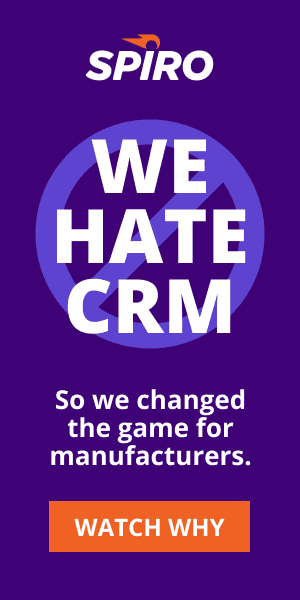6 Ways to Marie Kondo Your Sales Process
Decluttering is all the rage these days. Marie Kondo, the Japanese author and organizing consultant has burst into mainstream consciousness with her methods, which focus on keeping and organizing the things you love, or that in her words “spark joy,” while getting rid of everything else. In fact, she’s become so popular that thrift shops all across the country are being inundated with people dropping off their non-loved things because of her teachings.
Since this is a sales blog, and Spiro is the worlds first Proactive Relationship Management platform that helps you sell, we figured we’d come up with some ways for you to apply Marie Kondo’s methods to your sales process. Lots of salespeople are disorganized and even those who aren’t could always use a few more tips. Here are six ways you can “Marie Kondo” your sales process:
1. Spark joy for your prospects
Kondo talks a lot about “sparking joy.” For her, it’s in reference to keeping things that make you happy and getting rid of everything else. But in sales, you should always aspire to spark joy for your prospects. Legendary billionaire investor Warren Buffet actually agrees with this advice, saying that companies should focus on delighting their customers above all else.
How you spark joy will be different depending on what you’re offering, who your prospects are, and what strengths you have as an individual. But if your main focus is the happiness and joy of your prospects, everything else will easily fall into place.
2. Clean out your dead opportunities
Marie Kondo is most famous for advising people to get rid of their stuff, especially things that don’t make them happy. If you apply this to sales, you should get rid of things that don’t take you forward as a salesperson. The most logical place to apply this advice is to your pipeline, which is almost always filled with dead opportunities.
Go through regularly and clean up deals that aren’t going to close. This will allow you to focus on, and spend time on only those deals that are promising or have not yet been identified as dead deals. Not only will this make you a more organized and effective salesperson, it might make you feel a little more joy yourself.
3. Create an order
Kondo preaches organizing in order. This means that, rather than tackling everything at once, you should break everything you intend to organize into various categories and only focus on each of those categories, one at a time, until you’re done. Sales does require you to multi-task, and of course, you may get distracted, but breaking up your day into categories of what you’re going to focus on has made many salespeople quite successful.
For instance, you can devote the first hour of your day to only catching up on existing deals and emails. Then the next few hours can be devoted only to prospecting and calling new leads. Then you can spend an hour on administrative work, and so on. Spiro can help you stay extraordinarily organized, and not only helps you keep everything in perfect order and can even recommend who to call next, but also has some of the most in-depth reporting in the industry, allowing you a great view into your newly, perfectly-organized pipeline.
4. Resist the urge to store things for later
Kondo recommends that you don’t store anything until you’ve gone through and identified what you really want to keep and what you want to get rid of. Otherwise, storage becomes a never-ending cycle of storing things and buying new ones. And then buying new containers to store things in, and on and on.
You can easily apply this methodology to sales. We get new leads, we talk to all sorts of people, some of them close, some don’t, and we move onto new leads, and so on and so on. But what if you regularly circled back and worked the leads you already had? You would certainly end up closing more deals and have a higher closing percentage. Instead of always looking for the next lead, work the ones you have a bit harder and see what happens.
5. Surround yourself with the right people
Kondo writes this about her life: “When it comes to my environment as a whole, although it may not seem particularly special to anyone else, I am confident and extremely grateful to be surrounded by what I love, by things and people that are, each and every one, special, precious, and exceedingly dear to me. The things and people that bring me joy support me.”
Too many salespeople work in environments that either offer no support or simply aren’t a good fit for their abilities. It’s important to find a company, and managers who inspire you to be your best, rather than just proverbially beat your head in every day until you do what they say. If you’re not working in the right environment, consider making a change.
6. Visualize the destination
Kondo famously says, “Before you start, visualize your destination.” While she is referring to where you want to be after decluttering, this can be a valuable exercise for salespeople. Lots of other sales trainers and entrepreneurs say it another way, “Begin with the end in mind.”
By visualizing and thinking through where you want to be, whether it’s before a sales call, before a new month or quarter, or any other task ahead of you, you can not only visualize how things could go right, or wrong, but you can plan ahead for the eventualities and make sure that you put yourself in correct frame of mind before beginning. If you know where you want to end up, you’ll be able to work backwards to figure out the best path to getting there.

